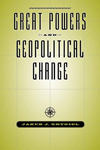Introducing Jakub Grygiel
 Dr Jakub Grygiel is a Senior Fellow at the Center for European Policy Analysis and the George H. W. Bush Senior Associate Professor of International Relations at the School of Advanced International Studies (SAIS) of The Johns Hopkins University (Washington, DC). Dr Grygiel received his PhD in politics at Princeton University and has written extensively on the revival of Russian nationalism and other topics related to the history, politics and economics of Central Europe.
Dr Jakub Grygiel is a Senior Fellow at the Center for European Policy Analysis and the George H. W. Bush Senior Associate Professor of International Relations at the School of Advanced International Studies (SAIS) of The Johns Hopkins University (Washington, DC). Dr Grygiel received his PhD in politics at Princeton University and has written extensively on the revival of Russian nationalism and other topics related to the history, politics and economics of Central Europe.
Geopolitical Passport
Your relationship with geopolitics
At what age did you discover geopolitics and what attracted you to it?
Maps and history always attracted me. Political events occur in space and time, and thus, the best way to study them is by considering the geographic setting and the historical context.
One simply cannot understand, for instance, European politics and international relations without having a clear sense of their geographic setting.
Which geopolitical topics have your focus and why did you choose especially these?
I wrote a book on geopolitics – or, more precisely, how a change in the underlying geopolitical map of the world affected the foreign policies and ultimately the political fate of three great powers (Venice, Ottoman Empire, and Ming China).
My interest was both in that particular historical moment characterized by the rise of “Atlantic Europe” and by the first period of global politics, as well as by the larger point of the effects of geopolitical changes on states.
What do you consider your most important contribution to geopolitics?
I do not claim to have any innovative perspective on geopolitics. If I have made a contribution, it is a small one and it is one of reaffirming a classical concept of geopolitics.
Your geopolitical preferences
What is your favourite definition of geopolitics?
It is a basic definition of the geographic setting of power – essentially it is the description of the “where” in history and politics. It is simple, basic, and timeless.
Which geopolitical scientist do you admire the most?
I do not like the idea of “geopolitical scientists.” Geopolitics is not a science but a descriptive art.
My favourite author is Nicholas Spykman – clear and cogent writer who had an enormous, if underappreciated, influence on US grand strategy. His few writings (“Geography of Peace”, “America’s Strategy in World Politics”, as well as a few shorter papers) are essential to any student of geopolitics and US foreign policy.
What is your favourite geopolitical book?
See previous question.
What is your favourite geopolitical website?
–
The geopolitical future
In what direction(s) will geopolitical science be heading the coming decades?
–
Which geopolitical subject has been too little in the spotlight and needs further research?
One topic that has been explored sporadically but lacks a systematic examination is how geography influences technology. This is especially important in the military realm where technological platforms are developed with particular operational theaters in mind and may not be as effective in other ones.
For example, much of the US military has been developed with the European region as the principal area of potential combat – a region that demands, for instance, short-range, fast, and stealth aircraft. In the Pacific, where distances are longer, bases less plentiful, and targets more numerous such platforms are less useful.
What will be the largest geopolitical challenge for the world in the 21st century?
There are many national security challenges in the next decades, ranging from a polynuclear world to the growing lethality of stateless actors and the declining capacity of states to harness the required powers to deter, defend, or win wars.
The more specific geopolitical challenge will be the question of whether China, a continental power, can turn into a maritime one and if so, what the consequences of global stability will be.

